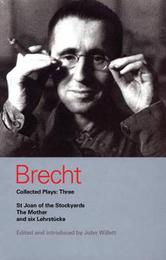
|
Brecht Collected Plays: 3: Lindbergh's Flight; The Baden-Baden Lesson on Consent; He Said Yes/He Said No; The Decision; The Moth
Paperback / softback
Main Details
| Title |
Brecht Collected Plays: 3: Lindbergh's Flight; The Baden-Baden Lesson on Consent; He Said Yes/He Said No; The Decision; The Moth
|
| Authors and Contributors |
Edited by John Willett
|
|
By (author) Bertolt Brecht
|
|
Translated by John Willett
|
|
Translated by Ralph Manheim
|
|
Translated by Geoffrey Skelton
|
| Series | World Classics |
|---|
| Physical Properties |
| Format:Paperback / softback | | Pages:464 | | Dimensions(mm): Height 198,Width 129 |
|
| Category/Genre | Plays, playscripts |
|---|
| ISBN/Barcode |
9780413704603
|
| Classifications | Dewey:832.912 |
|---|
| Audience | | General | | Tertiary Education (US: College) | |
|---|
|
Publishing Details |
| Publisher |
Bloomsbury Publishing PLC
|
| Imprint |
Methuen Drama
|
| Publication Date |
28 April 1997 |
| Publication Country |
United Kingdom
|
Description
The most comprehensive and authoritative editions of Brecht's plays in the English language Volume Three of Brecht's Collected Plays includes St Joan of the Stockyards - a play which recasts St Joan as Joan Dark springing hope into the hearts of factory workers at the mercy of meatpacker king Pierpont Mauler threatening cuts in the Depression; and the Lehrstucke or short 'didactic' pieces written during the years 1929 to 1933, are some of his most experimental work. Lindbergh's Flight, The Baden-Baden Lesson on Consent, He Said Yes / He Said No, The Decision,The Exception and the Rule, and The Horatians and the Curiatians reject conventional theatre; they are spare and highly formalised, drawing on traditional Japanese and Chinese forms. They show Brecht in collaboration with the composers Hindemith, Weill and Eisler, influenced by the new techniques of montage in the visual arts and seeking new means of expression. Also included is The Mother, based on Gorky's novel about the progress of a factory strike in Tver and the journey of a peasant mother from illiteracy to card-carrying communism. The translators include H R Hays (The Horatians and the Curiatians), Ralph Manheim (St Joan of the Stockyards), Tom Osborn (The Exception and the Rule), Geoffrey Skelton (The Baden-Baden Lesson on Consent), John Willett (Lindbergh's Flight;The Decision;The Mother) and Arthur Waley (He Said Yes / He Said No). The translations are ideal for both study and performance. The volume is accompanied by a full introduction and notes by the series editor John Willett and includes Brecht's own notes and relevant texts as well as all the important textual variants.
Author Biography
John Willett (1917-2002) was the greatest English language authority on Brecht the writer and man of the theatre. The foremost translator and editor of Brecht's drama, poetry, letters, diaries, theatrical essays and fiction, Willett produced a dozen volumes for Methuen Drama on the greatest modern German writer. Bertolt Brecht (1898-1956) is acknowledged as one of the great dramatists whose plays, work with the Berliner Ensemble and critical writings have had a considerable influence on the theatre. His landmark plays include The Threepenny Opera, Fear and Misery of the Third Reich, The Life of Galileo, Mother Courage and Her Children and The Caucasian Chalk Circle. John Willett (1917-2002) was the greatest English language authority on Brecht the writer and man of the theatre. The foremost translator and editor of Brecht's drama, poetry, letters, diaries, theatrical essays and fiction, Willett produced a dozen volumes for Methuen Drama on the greatest modern German writer. Ralph Manheim (b. New York, 1907) was an American translator of German and French literature. His translating career began with a translation of Mein Kempf in which Manheim set out to reproduce Hitler's idiosyncratic, often grammatically aberrant style. In collaboration with John Willett, Manheim translated the works of Bertolt Brecht. The Pen/Ralph Manheim Medal for translation, inaugurated in his name, is a major lifetime achievement award in the field of translation. He himself won its predecessor, the PEN translation prize, in 1964. Manheim died in Cambridge in 1992. He was 85.
|